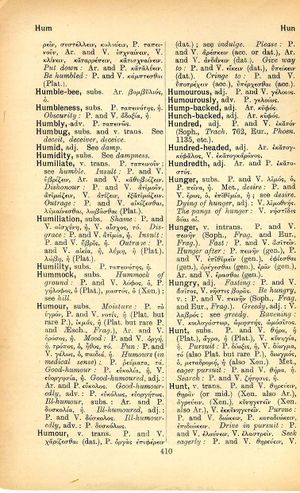humour
English > Greek (Woodhouse)
subs.
Moisture: P. τὸ ὑγρόν, P. and V. νοτίς, ἡ (Plat. but rare P.), ἰκμάς, ἡ (Plat. but rare P. and Aesch., Frag.), Ar. and V. δρόσος, ἡ. Mood: P. and V. ὀργή, ἡ, τρόπος, ὁ, ἦθος, τό. Fun: P. and V. γέλως, ὁ, παιδιά, ἡ. Humours (in medical sense): P. ῥεύματα, τά. Good-humour: P. εὐκολία, ἡ, V. εὐοργησία, ἡ. Good-humoured, adj.: Ar. and P. εὔκολος. Good-humouredly, adv.: P. εὐκόλως, εὐοργήτως. Ill-humour, subs.: Ar. and P. δυσκολία, ἡ. Ill-humoured, adj.: P. and V. δύσκολος. Ill-humouredly, adv.: P. δυσκόλως. v. trans. P. and V. χαρίζεσθαι (dat.), P. ὀργὰς ἐπιφέρειν (dat.); see indulge. Please: P. and V. ἀρέσκειν (acc. or dat.), Ar. and V. ἁνδάνειν (dat). Give way to: P. and V. εἴκειν (dat.), ὑπείκειν (dat.). Cringe to: P. and V. ὑποτρέχειν (acc.), ὑπέρχεσθαι (acc.).

